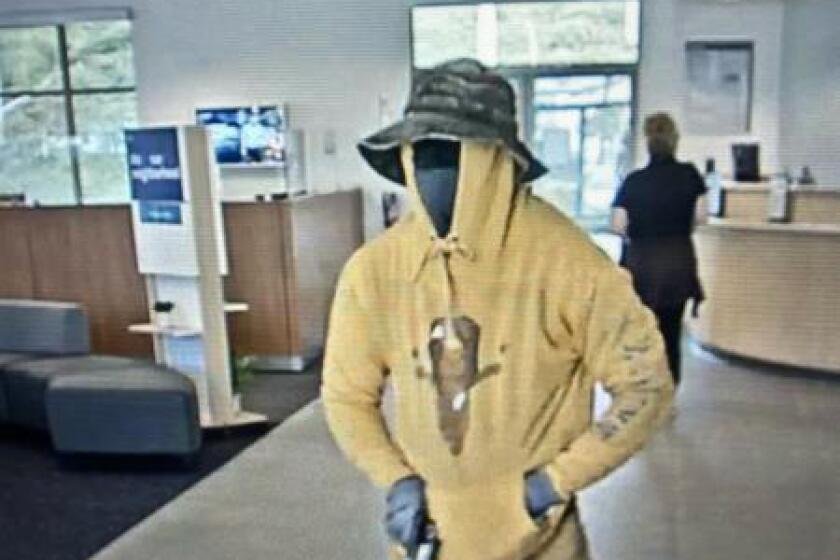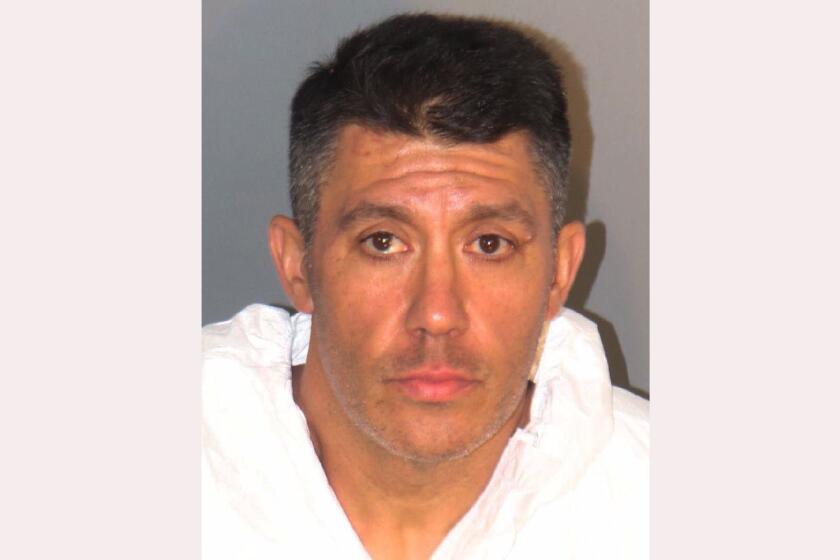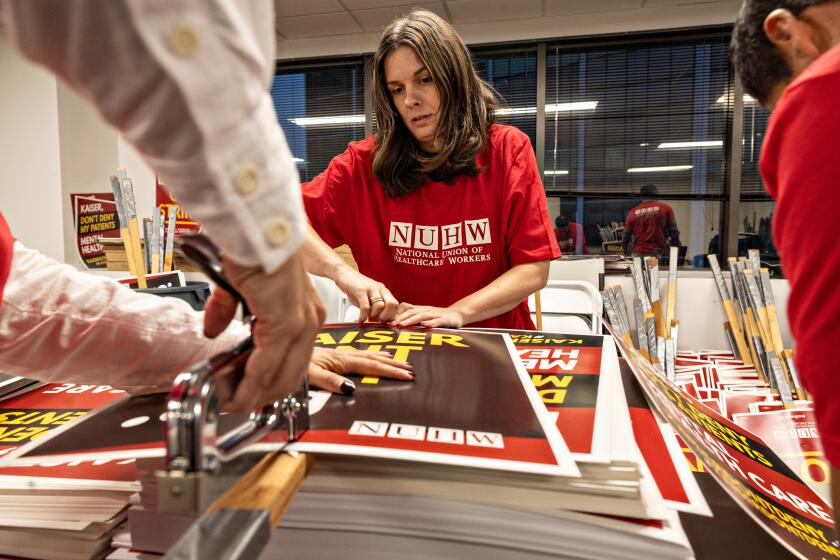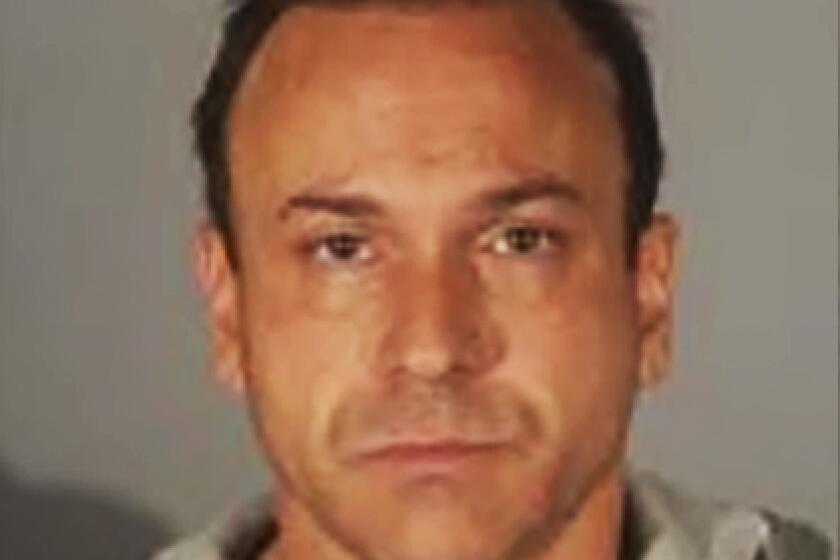A Line in the Sand : Tensions Persist Between Venice Boardwalk Merchants and Unlicensed Vendors
Just beneath the Venice boardwalk’s usual perfume of incense and white sage hangs an unmistakable whiff of unease.
The summertime police crackdown on performers, artists and self-proclaimed healers who collect donations for their work has given way to an anxious autumn truce. City officials are pondering exactly how to preserve the carnival feel of one of Southern California’s biggest tourist attractions and at the same time protect merchants nearby who fear they are losing business to growing numbers of unlicensed vendors.
“It’s just going to get worse as the Christmas season comes. There are people out there selling things that compete directly,” said Steve Heumann, manager of a firm that owns the boardwalk’s Sidewalk Cafe and two lots occupied by licensed open-air vendors.
Heumann and other merchants say something must be done to curb commercialization of the western side of the mile-long Ocean Front Walk, which is public land. There, alongside Tarot card readers and spray-paint artists, entrepreneurs sometimes hawk T-shirts and incense only feet away from recession-plagued vendors on the private east side who complain that they have to pay the overhead of taxes, permits and rent.
“We don’t have a problem with people out there doing their thing. We like it,” Heumann said, acknowledging that merchants depend on the millions of curiosity-seekers lured to the anything-goes street show. “(Merchants) just don’t like people competing directly across from them.”
On weekends, the boardwalk is a noisy bazaar and a crazy street stage for anyone with an act and a collection bucket.
Along the long stretch just north of the famed Muscle Beach outdoor gym, blues singers compete for attention with chain-saw jugglers while a legion of bored-looking Tarot card readers wait for customers at their card tables. Standing on a lonely patch of grass a man wearing a bikini and devil’s horns stumbles through “Love Potion No. 9” with his partner, a woman in a glittery Cleopatra wig and grass skirt.
The competition isn’t limited to the performers. The private east side is a long string of open stalls and small shops--offering a seemingly unending supply of sunglasses and Venice Beach T-shirts. Here you can get a massage in the same place you buy bracelets, or pick up a stick of incense where you get your ears pierced.
On the public west side, mixed in among the performers, huddles of tourists watch as astral-scene posters materialize from the spray of paint cans while a Rastafarian named Hendy minds a table covered with Malcolm X T-shirts. Everyone from New Agers to Scientologists peddle their books.
Here outright sales are forbidden, but the line between peddling and accepting donations gets blurry. A woman selling spray-painted posters told a reporter the works were probably worth a $10 donation, but when an interested customer approached she quoted a price of $25.
Police have quietly backed away from stepped-up enforcement of city laws banning the advertising and sales of anything but newspapers and magazines at the beach. Over the summer, police issued more than 50 citations to healers, fortune tellers, painters and performers for advertising and taking donations for their work, though most of the charges were dropped.
The crackdown, which police officials said came in response to complaints from the licensed merchants, angered the community of free-lance artists and performers and prompted a federal lawsuit claiming the laws violate the constitutional right to free expression in public spaces. Civil liberties lawyers for some of the cited artists and the group Save the Healers, Artists, Politicos and Entertainers (SHAPE) are planning a second federal suit and a parallel challenge to the city laws in state court.
Partially in response to the controversy, the city’s parks chief said the Department of Recreation and Parks plans a broad review of boardwalk uses early next year. The department may seek suggestions on how to regulate the public side of the boardwalk if any changes are thought to be necessary, said general manager Jackie Tatum.
Though those who favor tighter regulation along the boardwalk say they have no desire to wipe out the daily street show, SHAPE leader Jerry Rubin and supporters argue that any new restrictions are just the first step toward erasing Venice Beach’s longtime role as a town square for the counterculture--and a lucrative tourist trap.
“If you take all this away, they lose all that,” said self-proclaimed healer Demetrius Tahmin, pointing toward T-shirt stalls across the boardwalk.
Rubin is calling for a mediated settlement between his group and a coalition of local groups that support more boardwalk oversight. But so far, his call is winning little support from the participants in an unsuccessful mediation last spring. They said the first talks, which were arranged by staff members for Councilwoman Ruth Galanter, failed because Rubin and other SHAPE members dominated the discussions and refused to consider even minor regulation of boardwalk artists.
Rubin maintains that the mediation was going well and that representatives of groups such as the Venice Town Council and Venice Action Committee quit in order to get SHAPE out of the picture.
Since then, those groups, along with boardwalk merchants and a separate group of boardwalk artists and performers called the Venice Entertainment Guild, have worked out a proposal to regulate hawking there by assigning spaces through a system of permits. SHAPE opposes the proposal.
The plan was submitted to Galanter and then turned over to the parks department, where Tatum said it has been shelved pending the agency’s review of boardwalk policies. Galanter has tried to stay out of the dispute, urging residents and boardwalk artists to work out differences on their own.
The boardwalk has seen similar controversies, most recently over a crackdown on an explosion of free-lance hair wrappers last year after police were pressured by hair salon owners. A brief 1987 crackdown on so-called healers and other unlicensed people who solicited money came after reports of scams involving groups who claimed to be collecting money for charities.
Under pressure from SHAPE, the city’s no-hawking ordinance was amended last year to acknowledge the rights of nonprofit groups to collect donations for merchandise bearing political, philosophical or religious statements, but artists and entertainers were not included.
The summertime police push began with the distribution of an unsigned, three-page statement by the Los Angeles Police Department warning that artists selling their works were commercializing the public half of the boardwalk.
Stung by a welter of opposition, police officials now are permitting boardwalk artists to display up to two completed pieces while working on a third. Sgt. Michael O’Donnell, who heads the LAPD’s beach patrol, said the stepped-up enforcement succeeded in driving out the worst offenders.
“We’re going to relax it again in the spirit of the law as opposed to the letter of the law,” O’Donnell said. “Now it’s up to the artists.”
Galanter spokesman Jeff Kruger said the councilwoman would consider pushing for a change in the city law if the boardwalk community agreed on a solution.
Meanwhile, the existing ordinance faces a court challenge claiming that restrictions on boardwalk artists are unconstitutional.
The pending U.S. District Court case was filed on behalf of minstrel Harry Perry, the familiar turbaned guitarist who skates up and down the strip singing and selling cassettes and compact discs of his music, which he says is a way to spread his Sikh religion. Lawyers for Perry and SHAPE argue that those sales are protected by the 1st Amendment, relying on a 1990 U.S. appellate court ruling that allowed religious and other groups to sell their materials in San Francisco’s Fisherman’s Wharf and Union Square.
James Fosbinder, a Venice attorney representing Perry, said he plans to focus his case on Perry’s right to sell materials with a religious message. Perry said he and other local musicians are planning a concert at the boardwalk on Dec. 5 to draw attention to the issue.
“I don’t feel comfortable handing out flyers or selling my tapes,” Perry said Sunday. “I just do it and hope I don’t get popped.”
Fosbinder plans a second suit arguing that artists have a right to display their works on the public beach, and other civil liberties attorneys are planning parallel challenges in state court, he said.
Linda Lefkowitz, an assistant city attorney who has advised police on the matter, said it would be nearly impossible to craft an ordinance that satisfactorily covered all boardwalk artists and entertainers because it would require defining subjective terms such as art and creative.
“You’re dealing in sensitive areas of law that you’re probably better staying away from,” Lefkowitz said.
That leaves members of the boardwalk community--merchants, artists and police--to figure out a workable balance by themselves.
“We are trying to accomplish one thing--and that is to make the boardwalk a wonderful place,” said Diane Bush, who heads an Ocean Front Walk subcommittee of the Venice Action Committee. “Filing all these lawsuits is bad publicity. We’re better off letting Harry Perry do his strolling minstrel thing and keep the lawyers out.”
More to Read
Sign up for Essential California
The most important California stories and recommendations in your inbox every morning.
You may occasionally receive promotional content from the Los Angeles Times.










